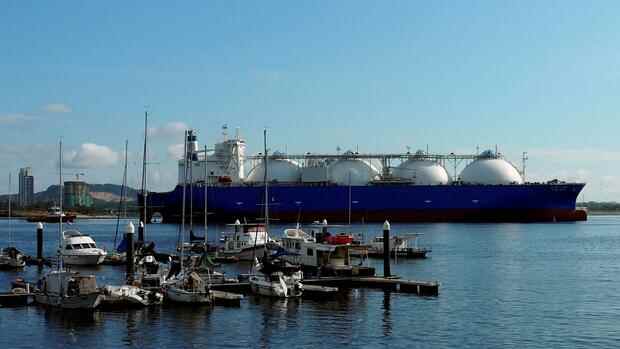Japan is reluctant to put its gas projects on the Russian island of Sakhalin on hold.
(Photo: Reuters)
Tokyo Russian President Vladimir Putin is on a confrontational course with Japan. After the Kremlin ruler had recently throttled the flow of gas to Europe, he is now taking on the Japanese gas projects on the Siberian island of Sakhalin. Through a presidential decree, Putin ordered the assets of Project Sakhalin-2, an oil and gas development project, to be transferred to a newly formed Russian company without compensation.
This move raises fears in Japan that the two Japanese investors and project participants, the trading houses Mitsui and Mitsubishi, could be excluded from the project. There is also growing concern that a freeze on the supply of liquefied gas from the Sakhalin project will exacerbate the acute power shortage in Japan. The country would then have to compete even harder with Germany and other European countries on the world market for liquid gas.
Japan imports nearly 100 percent of its fossil fuel needs. LPG plays an important role with around a quarter of the primary energy consumption of the third largest economy in the world. It is therefore probably due to Japanese restraint that analysts such as Ken Koyama, chief economist at the Japanese Institute of Energy Economics, see Putin’s action as merely an attempt to “shake up Japan”.
Locally, dependency on Russia is sometimes very high
Japan has firmly sided with Europe and the United States in the Ukraine war. No country in Asia has imposed similarly tough sanctions on Russia. Prime Minister Fumio Kishida also wants to strengthen relations with NATO. This week he became the first Japanese head of government to attend a NATO summit. In Japan, it is now feared that the country will be squeezed out of the strategic raw material investment in the Sakhalin project and that it will then go to China – similar experiences have already been made with an Iranian oil field.
Top jobs of the day
Find the best jobs now and
be notified by email.
Japan is far less dependent on imports from Russia than Germany. The Sakhalin-2 project accounts for about 9 percent of Japan’s LNG imports. But locally, the dependency is sometimes much higher. In Prime Minister Fumio Kishida’s constituency, for example, around half of the gas supplier’s requirements there come from Russia. In addition, the government is currently planning to reactivate old gas-fired power plants to alleviate the current electricity shortage.
>> Also read here: Russia’s eastern front: Japan swings from friends to conflict course
In view of the current heat wave, with temperatures locally exceeding 40 degrees, a “power supply warning” has already been issued in the capital region. The power reserve had fallen to less than five percent. Now the government has even called on the population nationwide for a three-month electricity-saving campaign to avoid bottlenecks.
If supplies from Russia should stop, Japan would have to find the necessary gas elsewhere. Fortunately, the ten-year supply contracts are still being fulfilled. However, the implications of Putin’s decree are not yet clear.
Japan’s Deputy Cabinet Secretary Seiji Kihara on Friday urged that Japanese interests must not be harmed by the move. The fear also applies to the Sakhalin-1 project, which Putin has not yet tackled. The Japanese government is even directly involved in this through its Ministry of Economic Affairs together with other trading houses. But even with Sakhalin-2, the details of the transmission are not yet unknown.
>> Also read here: Why Japan wants to hold on to oil and gas projects in Russia
According to the order, Moscow wants to set up a limited liability company as the new operating company. All assets, employees and rights of Sakhalin Energy, the current operator, are then to be transferred to that. However, the Japanese trading houses Mitsui and Mitsubishi hold 12.5 and 10 percent of the shares, respectively, and the oil company Shell 27.5 percent. Russia’s Gazprom owns the remaining 50 percent.
Bad memories of US nuclear dispute with Iran
After the outbreak of war, Shell announced that it would sell its shares. Chinese companies are said to be among the interested parties. In theory, Sakhalin Energy’s existing foreign shareholders can continue to participate in the new company. They only have to agree to the conditions of the Russian authorities, which have not yet been publicly disclosed.
If they refuse, Japanese trading companies could lose their investments in Sakhalin-2, according to the Japanese newspaper Nikkei. Japan suffered a similar trauma in Iran in 2010. In 2004, the then state-financed Japan Oil Development, today’s Inpex group, acquired 75 percent of one of the largest oil fields in the world.
But the government had to give up the shares when the US-Iran nuclear dispute broke out. At the time, the USA threatened Japan with sanctions if the Asians did not drop the project with Iran. A Chinese state-owned company ultimately took over the Japanese stake.
More: Rising LNG prices: High demand from Asia is jeopardizing Europe’s gas plans
